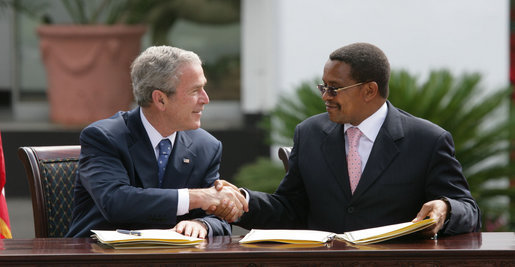
President George W. Bush and President Jakaya Kikwete of Tanzania, shake hands after signing the Millennium Challenge Compact Sunday, Feb. 17, 2008, in Dar es Salaam.
by Margaret Spellings
Over the last decade a quiet revolution has been underway in Washington, D.C. The change began ten years ago this week with the launch of the Millennium Challenge Corporation, the U.S. corporation that has transformed the nation's foreign economic aid. Prior to the MCC, policymakers were rightly frustrated about the lack of accountability in such aid.
This transformation is a model for sustained bipartisan action. Not only was the initial Millennium Challenge Act a bipartisan effort, both parties have shared its philosophy and implementation. The American taxpayer has been better served because this approach focuses on results and transparency.
The U.S. is a generous country and Americans have long supported programs to provide assistance to poverty-stricken nations. The Millennium Challenge Corporation changed the way we do that. This model, developed in the first term of George W. Bush's presidency, has rewritten the basic design of foreign aid.
No longer do countries simply receive funds because they appear deserving. Now they actively compete for U.S. dollars. They do so by proving their commitment to good governance, economic freedom, and investing in their citizens.
Applications to the corporation are judged on a wide-ranging set of indicators: confronting corruption, embracing transparency and getting results. These were established with support from institutions like Freedom House, the World Bank Institute, UNESCO and the Heritage Foundation.
All nations must adhere to the rule of law. They must protect their citizens' civil liberties and political rights. They must take a hard line against corruption. They must educate their children, girls as well as boys. And they must maintain economic policies that promote open trade and sound fiscal practices, welcome small businesses and guarantee land ownership rights.
Once nations pass the "challenge" to receive assistance, they must actively implement programs that benefit their people. MCC countries identify their own priorities for achieving sustainable economic growth and reducing poverty. Then they establish their own local organization to manage the funds - all with close oversight by an independent authority. They are responsible for being the owners and stewards of these programs. And they must be accountable for the work and transparent about the process.
The results of Millennium Challenge Corporation-funded projects speak for themselves:
- Three million people in Jordan, nearly half the kingdom's population, now have reliable access to clean water in one of the driest countries in the world;
- 1.4 million Tanzanians have access to electricity, many for the first time;
- More than 500,000 El Salvadorans gained access to jobs, markets, and services when a 136 mile highway was rehabilitated;
- Construction of 132 girl-friendly schools in Burkina Faso resulted in a 20% increase in student enrollment and rising test scores;
- More than 46,500 Moroccan farming families have increased agricultural production;
- The Ivory Coast passed a new family code, giving women the right to choose where they live, pursue a job or profession, and become a head of household.
These results last. After the Republic of Georgia followed MCC's guidelines, it vaulted from 112th to 9th on the International Finance Corporation's Ease of Doing Business Index. After its challenge grant ended, Honduras kept the organization it created through the MCC process to manage future development work. The organization now oversees a $427 million portfolio of additional donor funds.
As our front pages explode with grim news from abroad, it is even more important to recognize these examples of international success. As a nation, we also need to remain engaged in developing countries around the world.
One hundred years ago, as World War I started, the concept of an overseas conflict reaching our own nation seemed remote. In 2014, violent conflicts increasingly know no borders. All it takes is an airplane ride for a foreign crisis to become a domestic one.
Yet one thing has not changed: prevention is a better cure. The Millennium Challenge Corporation teaches developing nations how to grow their economies and support those who practice the principles of human rights and economic freedom. And it is working.
--
Margaret Spellings is president of the George W. Bush Presidential Center in Dallas.